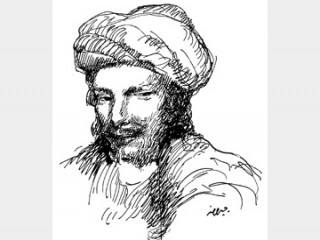
Abu Nuwas biography
Date of birth : -
Date of death : -
Birthplace : Ahvaz, Persia
Nationality : Persian
Category : Famous Figures
Last modified : 2010-11-06
Credited as : Poet, Anthology of Islamic Literature from the Rise of Islam to Modern Times 1966, Abu Nuwas in Life and Legend
Abu Nuwas (ca. 756-813) was the most famous Arab poet of the Abbasid era. His style was extravagant, and his compositions reflected well the licentious manners of the upper classes of his day.
Abu Nuwas was born in Ahwaz on the Karun River in western Persia. His father was Arab and his mother was Persian. At a young age he was sold into slavery because of family poverty; a wealthy benefactor later set him free. By the time Abu Nuwas reached manhood, he had settled in Baghdad and was writing poetry. It was at this time that because of his long hair he acquired the name Abu Nuwas (Father of Ringlets).
Gradually he attracted the attention of the caliph Harun al-Rashid and was given quarters with the other poets at court. His ability as a poet no doubt was one reason for Abu Nuwas's success with the Caliph, but after a while he became known as a rake and participated in less reputable pastimes with the ruler. Abu Nuwas spent some time in Egypt but soon returned to Baghdad to live out his remaining years. It is said he lived the last part of his life as an ascetic.
Abu Nuwas wrote about the way he lived. His chief topics were wine and pederasty. The Persian poets of a later era used wine in their poems only as a metaphorical symbol, but for Abu Nuwas the glories of debauchery and dissipation could never fully be expressed. He depicted with humorous realism his experiences in life, admitted his sins with remarkable frankness, and wrote that he would never repent although he recommended that others not follow his example. With ironic tones he composed a dirge for his own body wasting away from bad habits. He closed one poem by stating that he never expected his sins to be found out by God because he was too unimportant for God to take notice of his actions.
When reading Abu Nuwas's poetry, one must recognize that the majority of Arab poets—far more than Western poets—are more interested in clever formulations of their poems than in the actual content of their ideas. Thus exaggeration is to be expected.
The vast body of Abu Nuwas's work remains untranslated from Arabic. In English the only major work about Abu Nuwas, which also contains many of his poems, is W.H. Ingrams, Abu Nuwas in Life and Legend (1933). Ingrams divided his biographical discussion into three parts: the actual, the apocryphal, and the mythical. Two other most reliable works are Reynold A. Nicholson, A Literary History of the Arabs (1907; 2d ed. 1930), and Philip K. Hitti, The History of the Arabs (1937; 8th rev. ed. 1963). In both these works Abu Nuwas is seen in relation to his contemporaries. See also James Kritzeck, ed., Anthology of Islamic Literature from the Rise of Islam to Modern Times (1966).
















